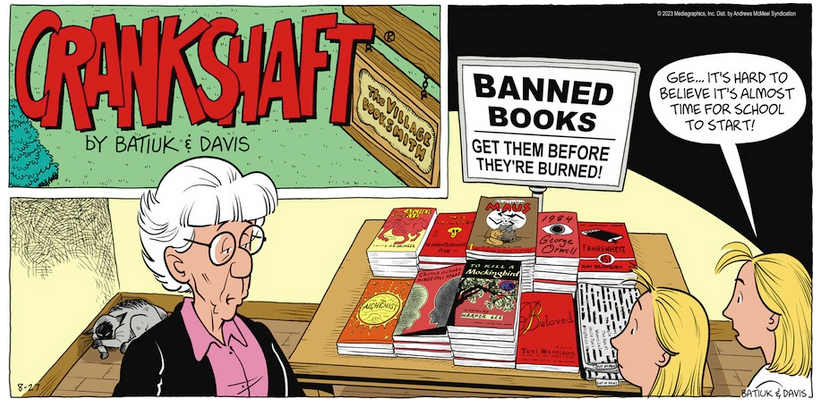Tom Batiuk to Launch Book Banning Series in Crankshaft Comic Strip
Skip to comments
Tom Batiuk, creator of the tremendously popular Crankshaft and Funky Winkerbean comic strips, has created a compelling storyline that illuminates the challenges librarians and store owners currently face around book banning. The series will begin August 26 and continue through October [2024].
As a former teacher and writer of the strips for many years, books and reading are essential elements of Batiuk’s creative and personal life. He offers an astute, insightful look into the genesis of this story line in the attached interview with writer David Giffels, sharing how this important topic was thoughtfully and organically woven into the strip. Two strips from the series are also attached.
Andrews McMeel Syndication has announced the beginning, on August 26, 2024, of a weeks-long (months-long?) story arc in Tom Batiuk and Dan Davis’ Crankshaft comic strip.
This will not be the first time Tom has tackled the subject in his comic strips.

In an interview with David Giffels Tom is asked and explains:
What inspired this storyline?
… I lived for the monthly appearance of the bookmobile where I’d read the Stevenson books and historical novels that my dad had read, and where I later gravitated to science fiction and authors like Heinlein, Bradbury and Asimov, who showed me that science fiction didn’t just have to be space opera and that it could deal with weightier subjects. I was also a teacher and later a writer for some fifty-plus years, so books have always mattered to me and been a fundamental part of my life.
And so to your question, once I had aged my comic strip characters to adulthood, I could now tackle things that were in the current zeitgeist. Both Funky Winkerbean and Crankshaft deal with schools, and, with book bans occurring across the nation, it seemed that things were reaching a critical mass. In Crankshaft, I have a character, Lillian, who’s a writer and a bookstore owner, and that alone almost obligated me to acknowledge the attempts to ban books. According to the American Library Association, a record number of book bans were initiated in 2023 with more than 4000 titles being targeted.

Did you have the experience of reading a book as a kid that later appeared on a banned books list?
Going back to that elementary school bookmobile, it’s where I first read Fahrenheit 451, and, when it came time to select a book for the banned books story arc, it was the obvious one that came to mind. The irony of banning a book that’s about a segment of society that’s burning books is almost too poetically perfect not to use.
Describe your process. Do you start with a topic ( eg. book banning) and write a storyline toward that, or do you discover the topics more organically through story development?
Actually, both. Usually, something has been gestating in my mind just kind of waiting for its moment, and often it’s something quite small that can open the door for the idea to enter the writing room and be expanded into a storyline. In this particular case, it happened when I was wrapping up the last week of Funky where the story had jumped ahead to the near future. A mother was taking her daughter to an antiquarian bookstore to buy a book for her birthday. I used the Village Booksmith from Crankshaft, and, as they ascend the stairs to the now dilapidated bookstore, the mother says that it’s one of the last ones to survive the floods — except that when I was typing up the script, I substituted the word burnings for floods. It’s one of those ah-ha moments that makes you sit up a little straighter in your chair and take notice. And now I had a path into the story. From there the story naturally unfolded as it tells about the bookstore owner, Lillian, offering to sell Fahrenheit 451 to the students for their class after the school board had banned it. I was pleased with the way it turned out, and, when it went over to the artist on Crankshaft, Dan Davis, his terrific artwork took it the rest of the way to the moon.

What surprised you as you were developing this narrative arc?
I was first caught by the strength and courage that Lillian showed even before the attacks on her bookstore. Even Ed Crankshaft showed a depth to his personality that hadn’t been seen before. Second, I’d forgotten about how I had broached this topic in the past. In Funky, I’d had the comic shop taken to court over some of the comics found in his store. And in Crankshaft, I revealed how not knowing how to read had derailed Ed’s major league baseball ambitions. In fact, I included a callback to that last story in the current arc because it was a microcosm of what being able to read books could mean to someone.
If not in your local paper Crankshaft can be read at the GoComics site.


Comments 4
Comments are closed.